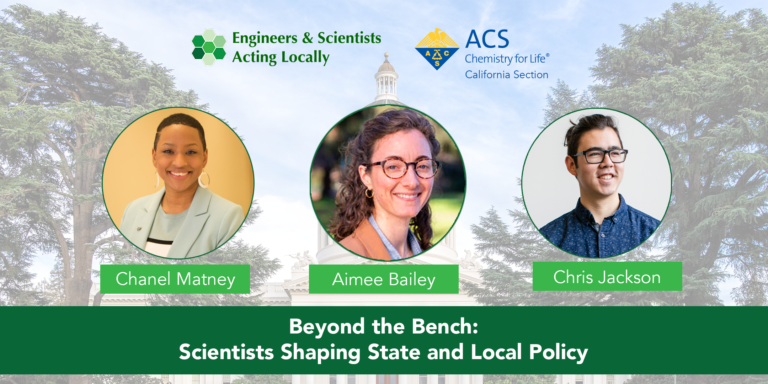
On September 8, ESAL co-hosted a virtual event with the American Chemical Society, called “Beyond the Bench: Scientists Shaping State & Local Policy.” The event was moderated by ESAL events team member Jared Mondschein, and featured a panel of three scientists who have successfully made, or are currently making, the career transition.
Chris Jackson, a chemistry Ph.D. student at UC Berkeley, served as one of the panelists. He has been actively pursuing policy-related activities through his involvement with the Science Policy Group at Berkeley, the Journal of Science Policy & Governance, and ESAL.
He offered this piece of advice to students and early career scientists who are hesitant about their lack of experience, “You don’t have to wait until you’ve met some bar to do science policy. The best time to start engaging, especially locally, is now.” Jackson suggested visiting your local government’s website, or attending a virtual city council meeting to scope out ways to get involved.
The upside of local policy is the ability for immediate impact, a sentiment that was echoed by fellow panelist Aimee Bailey, who works as director of decarbonization and grid innovation at Silicon Valley Clean Energy, a county utility agency in the Bay Area that works on electrification and climate change initiatives.
“Local government is more than just parking tickets. If you are drawn towards mission and impact, now more than ever there are opportunities locally,” said Bailey. A lot of the leadership on climate change is happening in cities, which enact ordinances that can bubble up to the state or higher levels of government. Bailey also noted the sense of humanity that comes from working in a local setting, because you are inherently integrated in the community.
Representing the state level was Chanel Matney, who works as a transportation policy consultant for the California State Assembly. She brought her arc of personal experience to the panel, reflecting on her time as a neuroscience Ph.D. candidate, which coincided with the first Black Lives Matter movement, and her insights as a policy professional.
In graduate school, she realized she enjoyed talking about and sharing her science with others and discovered policy as a way to create meaningful outcomes. Matney co-founded the Science Policy Group at Johns Hopkins University and currently serves as the mentorship and professional development coordinator for the National Science Policy Network. As a legislative consultant in California, Matney’s described her job of wrangling the appropriate type and amount of technical information, “People trust you to figure it out. I don’t reinvent the wheel. I always ask the experts and find the resources to get the right answer.”
During the Q&A session, the panelists addressed questions from the virtual audience about the skills needed to succeed in science policy. Jackson brought up the importance of concise communication. Written policy pieces are supposed to be short with main ideas front-loaded, as opposed to the long-winded nature of academic writing. Fortunately, you can develop these skills through practice. “You’re not writing for yourself, you’re writing for someone else,” said Jackson. Matney added that memos, talking points, and op-eds are common policy “work products” on which to train. And don’t forget to ask for feedback.
All three speakers emphasized networking in the close-knit policy community. For Jackson, as someone who didn’t know about science policy three years ago, he found informational interviews to be immensely helpful, both to learn about the work and to meet people already in the field. Formal programs such as the AAAS Science & Technology Policy Fellowship and the California Council on Science and Technology Fellowship, offer the advantage of providing participants with a built-in network. The AAAS fellowship, for example, helped launch Aimee Bailey’s career in energy policy.
“Networking, networking, networking. Leverage your contacts. In the policy world, everything is so relationship driven,” explained Matney. During her transition into policy, she spent a lot of time talking to and shadowing potential mentors. Matney developed what she calls her “council of advisors,” a group of colleagues and professionals whom she can turn to for advice, encouragement, and feedback. She recommends everyone find their own group of mentors in their field. Matney’s final piece of advice: “Don’t go it alone. Start putting that energy out into the universe.”
A recording of this event is available on YouTube.